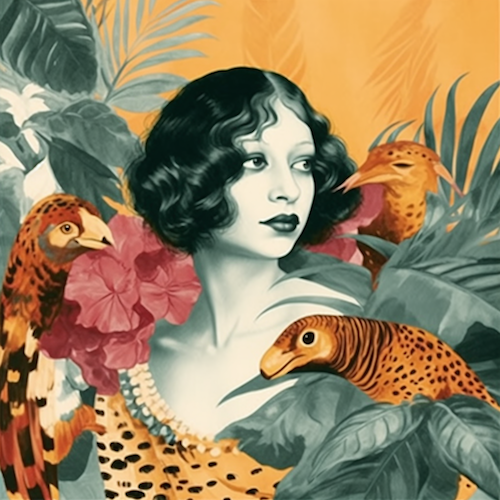¶ Patrícia Galvão, "Pagu": Defying Norms and Inspiring Change

¶ Introduction
Patrícia Galvão, known as "Pagu," was a Brazilian prolific writer and artist, creating a diverse body of work that spanned various genres, including journalism, literature, poetry, illustration and theater. Her works reflected her sharp intellect, social consciousness, and unwavering commitment to feminism and political activism.
She was born on May 9, 1910, in São João da Boa Vista (São Paulo), Brazil, from a wealthy and conservative family. She would come to epitomize the spirit of defiance and creative expression in a time of societal upheaval, having an incredible life through many professions and countries.
¶ Beginnings
Pagu's early years saw her emerge as a muse of the luminaries of Brazilian modernism, a movement that sought to redefine artistic and literary norms in the early 20th century. Her radiant personality and intellectual prowess quickly captured the attention of prominent figures, earning her a place in the inner circles of Brazil's avant-garde. At the age of 19, she started a romantic relationship with Oswald de Andrade (20 years her senior), one of the most prominent artists in the modernist movement, who was married at the time with painter Tarsila do Amaral. They married in 1930 and that caused a huge scandal at the time.
¶ Political Activism
However, Pagu's trajectory evolved beyond artistic muse as she found her voice as a journalist, which marked the beginning of her transformation into a feminist and political force. Her incisive writings exposed the harsh realities of Brazilian society, highlighting issues like women's rights, labor struggles, and social inequality. Her fearless critique of the status quo demonstrated her commitment to social justice, establishing her as a prominent figure within the nascent feminist movement.
As Pagu's activism intensified, so did her clashes with the authorities. Her fearless convictions led her to join the Communist Party, a decision that would ultimately alter the course of her life. In 1931 she took part in a strike by longshoremen in Santos (São Paulo) and was arrested by Getúlio Vargas's political police. This was the first of a series of 23 arrests throughout her life.
In 1934, she was exiled in Paris under a false identity, working at newspaper L’ Avant-Garde and as a film translator. During this time she met André Breton, Paul Éluard, René Crevel and Louis Aragon, all part of the French Avant-Garde. She took part in the French Communist Party and was arrested three times.
In 1935 she was deported. Back in Brazil, Pagu separated from Oswald de Andrade and resumed work as a journalist. She was arrested and convicted in two trials. She spent four years in total in prison, where she was tortured. In 1940, she married the writer, journalist, and literary critic Geraldo Ferraz, with whom she would remain until the end of her life.
The later years of Pagu's life witnessed yet another remarkable transformation as she delved into the realm of theatrical direction. Drawing from her rich experiences, she penned compelling works that merged her creative spirit with her commitment to social change. These plays reflected the complex tapestry of her life, filled with resilience and rebellion.
¶ Death
Pagu passed away on December 12, 1962, leaving behind a legacy that continues to inspire and captivate. Her journey from muse to feminist journalist, from political activism to imprisonment and exile, and finally to her prolific output as a director, serves as a testament to her indomitable spirit and enduring contribution to Brazilian literature, feminism, and social justice.
¶ Some of Pagu’s Works
¶ Literature:
- "Parque Industrial" (Industrial Park, 1933): Pagu's debut novel, it is considered the first Brazilian proletarian novel. It provides a raw and critical portrayal of the lives of female factory workers, shedding light on their struggles, dreams, and aspirations amidst a rapidly changing society.
- "A Famosa Revista" (The Famous Magazine, 1945): Co-written with Geraldo Ferraz, this book is full of drama and lyricism and at the same time brings a heavy criticism on the Communist Party.
¶ Journalism:
- Pagu was an influential journalist, writing for various newspapers and magazines over three decades, such as O Homem do Povo, A Vanguarda Socialista, Diário de São Paulo, etc.
- Between 1933 and 1934, during a trip around eight countries (Brazil, the US, Japan, China, Russia, Poland, Germany and France), she published articles at Diário de Notícias, Correio da Manhã and Diário da Noite. Her articles covered a wide range of topics, including women's rights, social inequality, politics, and cultural commentary. She interviewed Sigmund Freud, George Raft, Raul Roulien and Miriam Hopkins. From 1945 until 1956 she worked at France-Presse Agency.
¶ Theater:
- Pagu's foray into directing and playwriting marked a significant phase in her artistic career. During the 1950’s and early 1960’s, she wrote "Fuga e Variações" and translated Ionesco's "A Cantora Careca" (The Bald Soprano). In 1958 she co-directed "Fando e Lis" by Fernando Arrabal alongside Paulo Lara. She also spearheaded the coordination of the First Amateur Theater Festival of Santos and Litoral, championing avant-garde theater. Moving into the 1960s, she engaged in meetings with Jean-Paul Sartre and Eugéne Ionesco in São Paulo and Rio. Her accomplishments include translating and directing Octavio Paz's "A Filha de Rappaccini" (Rappaccini's Daughter) in Santos. In 1961, she continues her translation work by bringing Par Lagerkvist's play "O Túnel" (The Tunnel) into Portuguese.
Source:
http://www.pagu.com.br/